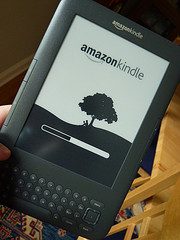
- Image by The Shifted Librarian via Flickr
It is time to revisit the pros and cons of the Kindle, which has finally plummeted into the land of reasonable pricing. Let’s go back to some of the reasons we quoted for buying and not buying a Kindle last year, and update it a bit.
Reasons to Buy a Kindle
- It’s Great For Travel
- You can email files to your Kindle address. With the new Wi-Fi option, you can do so for free. Over 3G it costs a few cents. But you can set a threshold to avoid overcharging
- It looks great. Especially in graphite. The screen is much more conducive to long periods of reading than a conventional LCD screen. They’ve really improved the contrast. It is still in greyscale, but this is for reading. You want color, go to your computer.
- Almost any book is available. And publishers and content owners can pull out old and out of print books and sell them on the Kindle as there is only a small cost to start out. Crunchgear reports the U.S. Kindle store has over 700,000 books. Barnes and Noble claims more, but includes public domain books in its tally, something Amazon apparently does not.
- It is the future. Paper books won’t die, we don’t want them to.
- You can switch seamlessly between your Kindle and reading the book on your computer, smartphone, etc. as Amazon has released Kindle apps for most major platforms.
- Amazon is a large, stable company and the likelihood of them discontinuing the Kindle and taking your e-books with them is probably slim.
Reasons Not to Buy a Kindle
- Books…old ones at least, can be cheaper.
- There is still a value to the printed book
- No expansion slot, but the new one has 4GB of memory, which is an estimated 3,500 books.
- It must be charged. Your paper book never needs any batteries. Admittedly, advertised battery life is measured in weeks, not hours like most devices.
- You are locked into the Kindle format. Your property is licensed, not owned, and you cannot move it to other platforms.
- It doesn’t support EPUB format, which means you’d have to convert any book delivered in that format.
- It doesn’t support lending, which the Nook limitedly does.
- You can read periodicals for free online, why do they make you pay to subscribe to a blog?
Just remember, when we started advising against the cost of an e-book reader, it cost about four hundred dollars. For that price you could buy a computer. Now, at $139 for the wi-fi only version that we bought, or $50 more for adding 3G, it is at a price point that makes it more realistic. We’d like to see sub-$100 pricing soon, at least on the wi-fi version. The Kindle has estimated sales of about 5 million since it launched in 2007. The latest one is so popular it keeps getting sold out. The Nook, by comparison, has sold 1 million since it launched last year.
Books are are an over twenty billion a year business. About eight percent of U.S. readers use an e-book reader and in a recent poll, twelve percent of Americans said they are likely to get one within the next six months. Of course, the same poll indicated that e-reader purchasers were more likely to read(not a big surprise) and that the majority of them read more now than they did six months ago.
“”Customers tell us they love the freedom and flexibility of our Buy Once, Read Everywhere approach because they always have their full reading library at their fingertips and never lose their place in a book-whether they are reading on a Kindle or one of their other favorite devices,” said Dorothy Nicholls, Director, Amazon Kindle, in a recent press release announcing an update to Kindle for Android. The idea is this. If your platform is locked down, but you can get it on any device, is that not the type of DRM you can live with? The biggest complaint about DRM is the lack of portability. We’d like to see things more open, but given the choice between DRM content and no content at all…
In the music business, choosing between DRM-music and buying a CD kept us with CDs, which could be turned into DRM free music. We’ll see what happens. For the Kindle, the issue of library lending has to be handled. the revenue from selling licenses and services to libraries can be a wonderful one if they unveil a system to do so. Why should Overdrive Media Console and Adobe Digital Editions have this market?
To go back to the issue of EPUB and loading your own stuff onto it…you can load PDF files onto it. And if you don’t want to hook up via USB, you can email it to username@free.kindle.com to get it over Wireless. username@kindle.com to be charged for over 3G. And programs like Calibre, which we will get into in another post, can be set up to not only convert e-books from Google and Project Gutenberg, but support Kindle profiles and assemble news sources into an e-book format and autotransfer it to the Kindle every day, so you do not get charged(which you will if you subscribe to same through Amazon).
There is one final thing we have to get to. Many of us, including our editor, are Android phone users. Reading books on a 3-4 inch phone screen is doable, but it is small and can hurt one’s eyes. so, while it is doable for short periods, there is still a market for a device more conducive to reading.
And even with the larger LCD screen, the iPad hasn’t killed the Kindle yet, has it?
What do you think?

